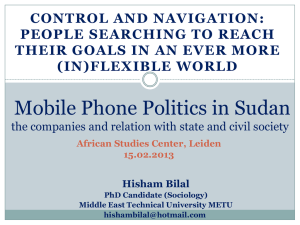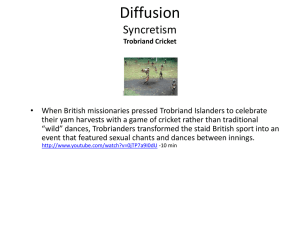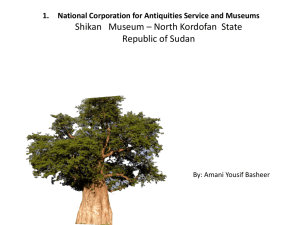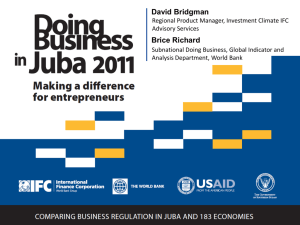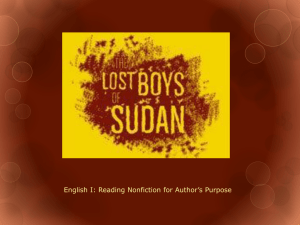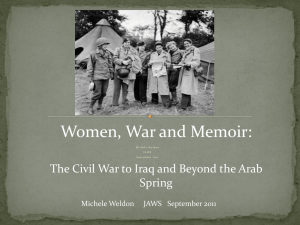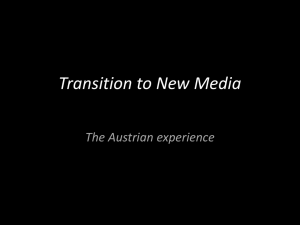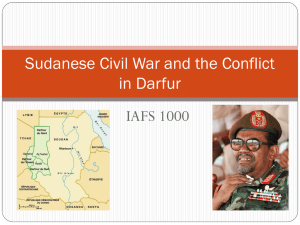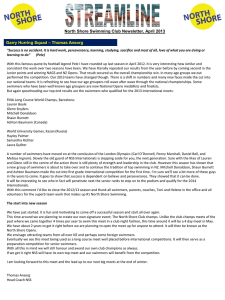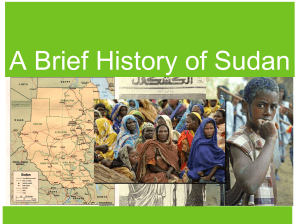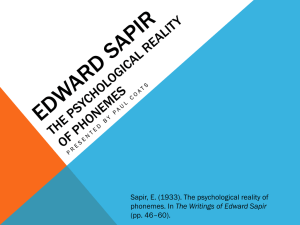The Price of Silence-AI-HRW 1 August 2014
advertisement
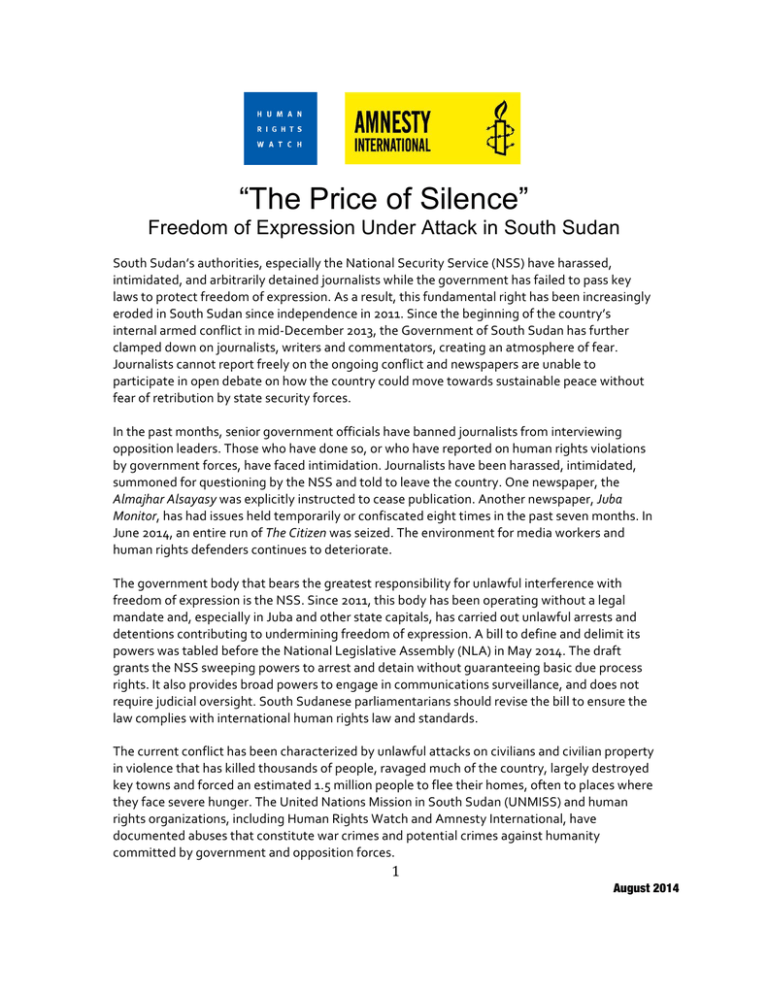
“The Price of Silence” Freedom of Expression Under Attack in South Sudan South Sudan’s authorities, especially the National Security Service (NSS) have harassed, intimidated, and arbitrarily detained journalists while the government has failed to pass key laws to protect freedom of expression. As a result, this fundamental right has been increasingly eroded in South Sudan since independence in 2011. Since the beginning of the country’s internal armed conflict in mid-­‐December 2013, the Government of South Sudan has further clamped down on journalists, writers and commentators, creating an atmosphere of fear. Journalists cannot report freely on the ongoing conflict and newspapers are unable to participate in open debate on how the country could move towards sustainable peace without fear of retribution by state security forces. In the past months, senior government officials have banned journalists from interviewing opposition leaders. Those who have done so, or who have reported on human rights violations by government forces, have faced intimidation. Journalists have been harassed, intimidated, summoned for questioning by the NSS and told to leave the country. One newspaper, the Almajhar Alsayasy was explicitly instructed to cease publication. Another newspaper, Juba Monitor, has had issues held temporarily or confiscated eight times in the past seven months. In June 2014, an entire run of The Citizen was seized. The environment for media workers and human rights defenders continues to deteriorate. The government body that bears the greatest responsibility for unlawful interference with freedom of expression is the NSS. Since 2011, this body has been operating without a legal mandate and, especially in Juba and other state capitals, has carried out unlawful arrests and detentions contributing to undermining freedom of expression. A bill to define and delimit its powers was tabled before the National Legislative Assembly (NLA) in May 2014. The draft grants the NSS sweeping powers to arrest and detain without guaranteeing basic due process rights. It also provides broad powers to engage in communications surveillance, and does not require judicial oversight. South Sudanese parliamentarians should revise the bill to ensure the law complies with international human rights law and standards. The current conflict has been characterized by unlawful attacks on civilians and civilian property in violence that has killed thousands of people, ravaged much of the country, largely destroyed key towns and forced an estimated 1.5 million people to flee their homes, often to places where they face severe hunger. The United Nations Mission in South Sudan (UNMISS) and human rights organizations, including Human Rights Watch and Amnesty International, have documented abuses that constitute war crimes and potential crimes against humanity committed by government and opposition forces. 1 August 2014 Both international and South Sudanese journalists have struggled to report on the abuses. In an increasingly fearful atmosphere, many journalists and human rights defenders have resorted to self-­‐censorship, carefully crafting articles and statements to avoid antagonizing the government, opting out of public appearances or television and radio interviews. One journalist described how uncertainty over what will be tolerated by government officials or state security personnel has diminished reporting. “The level of risk is constantly hard to gauge. One never knows which story would set [the government] off. It is never clear what a red line would be.” Unable to do their job, some journalists and activists have left the country. A human rights lawyer in Juba explained, “If you stay, you pay the price of silence.” As so many others in South Sudan, journalists and human rights defenders have also been impacted by the conflict itself. Some have witnessed violence or have been personally targeted. Many have been displaced due to the fighting or forced to leave the country. Media infrastructure has been damaged or destroyed, including one radio station in Leer, another in Malakal and two in Bor. Following the opposition takeover of Bentiu, Radio Bentiu FM was used to call on young men to commit acts of sexual violence against Dinka women and girls. The government clampdown takes place at a time when South Sudan, needs independent voices to contribute to national discussions about lasting solutions to the political crisis and internal armed conflict. Uncensored articles, opinion pieces, radio interviews and television coverage are critical to the national conversation about how best to move the country forward. The government and the opposition have affirmed that the Intergovernmental Authority on Development (IGAD)-­‐brokered peace negotiations between the two parties in Addis Ababa should be inclusive and involve the participation of a broad range of stakeholders, including civil society, faith-­‐based leaders and other political parties. Commitment to inclusivity requires there be space in South Sudan for analysis—and critique—of how and why the government has failed to live up to expectations since the Comprehensive Peace Agreement (CPA) ended Sudan’s long conflict in 2005. The current abuses add to a contemporary history of unaddressed abuse of media by state security organs. Since South Sudan’s 2011 independence, journalists have been “picked up” by the NSS, soldiers or other security services, unlawfully detained in poor conditions, intimidated and threatened, sometimes at gunpoint. Journalists have had their equipment taken from them because government authorities were unhappy with their stories. Journalists have been arrested for not reporting on a speech by President Salva Kiir. On numerous occasions, editors have been threatened for stories they have run or warned off particular topics. Over the past three years NSS intimidation, including being “called in” to NSS or having NSS personnel visit media premises has become part of journalism in South Sudan. Government authorities have not taken steps to investigate and hold accountable state security services responsible for violations of freedom of expression. Authorities have also failed to diligently investigate and bring to justice the killers of journalist Isaiah Abraham, shot dead in Juba on 5 December, 2012 by unidentified gunmen. Abraham’s writings were often critical of the government and the murder was a watershed moment for South Sudan’s journalists, 2 “The Price of Silence” compelling many to self-­‐censor criticism of the government. Other journalists received anonymous or NSS threats during this period and were forced to leave the country. More generally, failure to ensure justice for past abuses helped to create conditions ripe for further conflict in 2013. Moving the country forward will require confronting, rather than covering-­‐up, widespread abuses by both the government and opposition forces since 15 December, 2013 including massacres, the widespread targeting and killing of civilians often because of their ethnicity and assumed political affiliations and the destruction of civilian property. But current restrictions on freedom of expression also limit opportunities for accountability. Any hope for justice for crimes committed during the new conflict and the success of any future truth-­‐telling process will require a safe environment in which South Sudanese can speak openly about abuses they witnessed or experienced. Freedom of expression must be protected, not regularly attacked, as in the past seven months. Restrictions on Conflict Reporting: Broadcasting Interviews with Opposition is “an offence” Verbal bans by government officials on interviewing opposition forces, harassment of journalists and the forced closure of one newspaper, the Almajhar Alsayasy, have stymied journalists’ ability to report on the conflict and have, in effect, censored opposition voices in the media. In mid-­‐March 2014, Minister of Information and Broadcasting Michael Makuei said in a recorded interview on the Voice of America (VOA) that reporters should not broadcast or publish interviews with rebels as this was “subversive activity” and “an offence.”1 “When you go and interview a rebel far away from here and you come and play that interview in a government territory and you know this man is not friendly, this is not the meaning of journalism,” he told journalists.2 In the interview, Makuei directed a particular critique against the Juba-­‐based Eye Radio, which had broadcast a press conference by opposition members Alfred Ladu Gore and Angelina Teny. Following this broadcast, three NSS officers complained to the station manager, demanded tapes of the broadcast, and questioned several staff members, detaining one, the expatriate staff, the editor in chief, for several hours. They also confiscated the station’s registration 1 Makuei’s March 2014 statement echoed another statement to journalists on December 21, 2013, a few days after violence the government has maintained was the result of an attempted coup by Machar subsided in the capital. In this statement, Makuei criticized journalists for the content of stories and appeared to threaten them. “How did you decide to send such information without first confirming it from us? Anyone who goes astray will not be tolerated,” he said. After complaining journalists had not reported the Juba violence as a coup, he said: “I want you to be honest, responsible and accountable for whatever you do. From now onwards we will be very strict.” A recorded video of Makuei’s December statement can be viewed here: https://www.youtube.com/watch?v=Fabn7osAafg (accessed 31 July 2014). 2 South Sudan Information Minister Michael Makuei speaks with Jonn Tanza, 12 March 2014, http://www.voanews.com/audio/audio/385546.html (accessed 31 July 2014). 3 August 2014 certificate and the expatriate’s passport, returning it over two weeks later when she complied with an oral request to leave the country.3 Neither Makuei nor the Ministry of Information and Broadcasting has provided a written explanation laying out the parameters of this apparent ban on broadcasting interviews with opposition leaders. Nor has the Ministry clarified under what legal provision doing so would be an “offence.” In another case, the Almajhar Alsayasy Arabic language newspaper was shut down in March 2014, because of how the newspaper described the conflict’s genesis and for interviewing politicians critical of the government. On 3 March 2014, NSS Director of Internal Security, Major General Akol Koor, sent a letter to the Ministry of Information and Broadcasting accusing the newspaper of “spreading lies to the public with an aim of deliberately confusing and misrepresenting the circumstances that led to the onset of the current crisis…” and of “conducting exclusive interviews with disgruntled politicians.”4 Under this apparent instruction of the NSS, an official in the Ministry called the editor-­‐in-­‐chief to inform him that his paper had been suspended. The editor-­‐in-­‐chief wrote letters of complaint to NSS and the Ministry, citing constitutional protections of freedom of expression, but received no response.5 When Amnesty International sought further information about the suspension of Almajhar Alsayasy, Madut Wol, the Director for Information in the Ministry of National Security, explained media houses are summoned to the NSS if they write articles that “touch on the government.” “We will ask you to come and explain. If we ask you to explain and you fail to explain what your intentions are and give us a good explanation, we will write to the Ministry of Information and ask them to ban your activities,” he said.6 A newspaper editor said that in December, under instruction from NSS officials, he did not run the second part of an article about two politicians—the former Secretary General of South Sudan’s leading Sudan People’s Liberation Movement (SPLM) political party, Pagan Amum, and a former Minister, Deng Alor—who were arrested in mid-­‐December 2013 by government officials who said they had helped organize the alleged coup in Juba. This NSS instruction led the editor to tailor reporting to avoid antagonizing the government. “We have done a lot of self-­‐censorship since then. We have not published any opposition statements,” the editor said.7 Reporting about the government by radio stations in opposition-­‐controlled areas has also been constrained. A radio station in Nassir, an area at the time under opposition control, was 3 Human Rights Watch interviews with journalists, Juba, 9 June 2014. Letter from Maj. Gen. Akol Koor Kuuc, Director General, Internal Security Bureau to Hon. Michael George Garang, Undersecretary, Ministry of Information, Television and Broadcasting, 3 March 2014, RSS/NSS/DG/ISB/J/05/14 (on file with Amnesty International). 5 Letter from Almajhar Alsayasy to the Minister of National Security 4 March 2014 (on file with Amnesty International); Letter from Almajhar Alsayasy to the Minister of Information and Broadcasting 12 March 2014 (on file with Amnesty International). 6 Amnesty International interview with Madut Wol, Director of Information, Ministry of National Security, Juba,25 March 2014. 7 Human Rights Watch interview with journalists, Juba, 10 June 2014. 4 4 “The Price of Silence” reportedly criticized by opposition forces as being too pro-­‐government and asked to cut all government messages.8 Cover-­‐up: Restricting Reporting on Human Rights Violations Both the government and opposition forces have committed serious violations of international humanitarian law since the conflict began, including extrajudicial executions of civilians.9 The NSS has intimidated, harassed and detained journalists for reporting on human rights violations, calls for accountability and public discontent with government. According to one journalist, the government’s actions are “clearly related to an effort to cover up crimes committed by the regime.”10 On 16 December 2013, soon after conflict began in Juba, two international journalists attempting to report on the violence that included attacks on civilians were stopped by soldiers, who threatened to kill them at gunpoint and stole their mobile phones and other equipment. They were then detained in an NSS building for three days during which they were denied food. They were released on 18 December 2013. Their equipment was never returned to them.11 In mid-­‐January 2014, armed NSS personnel visited a media house, threatened to arrest one of the editors, demanded that he report to the NSS headquarters the next day, and questioned him about why he had visited the Mangaten neighbourhood in Juba. Mangaten is one of the areas where Nuer civilians were targeted and killed by government security forces during the mid-­‐December 2013 violence. The same evening and in the days following, several reporters of the same media house received phone calls threatening them to, for example, ‘stop reporting nonsense’.12 On 21 January 2014, an American journalist was summoned to the NSS headquarters where he was accused of fabricating information and slandering the NSS. He was shown a dossier of articles by his media outlet that covered targeted killings and other human rights violations. The NSS confiscated the journalist’s passport and told him to return the next day. When he returned, a senior NSS officer told the journalist, “You have to go.” Armed NSS officers escorted him to Juba airport and he left the country the same day. The NSS Director of 8 Human Rights Watch interview with journalist, Juba, 9 June 2014. Amnesty International, Nowhere Safe: Civilians Under Attack in South Sudan, (Index: AFR 65/003/2014), http://www.amnesty.org/fr/library/info/AFR65/003/2014/en; Human Rights Watch, “War Crimes By Both Sides: Commanders Need to Halt Abuses, African Union Should Begin Inquiry,” 27 February 2014, http://www.hrw.org/news/2014/02/26/south-­‐sudan-­‐war-­‐crimes-­‐both-­‐sides; Human Rights Watch, “Ethnic Targeting, Widespread Killing: Civilian Protection, Independent Inquiry Needed,” 16 January 2014, http://www.hrw.org/news/2014/01/16/south-­‐sudan-­‐ethnic-­‐targeting-­‐widespread-­‐killings. 9 Amnesty international interview with journalist, Juba, 20 March 2014. 10 Amnesty international interview with journalist, Juba, 20 March 2014. 11 Human Rights Watch interview with journalists, Nairobi, 15 July 201. 12 Amnesty International and Human Rights Watch email correspondence with journalist, 31 July 2014. 99 5 August 2014 Information later explained that this journalist had written “articles inciting the public against the government.”13 In early March 2014, a Voice of America reporter was picked up by NSS officers together with the manager of a radio station. NSS held them for approximately eight hours at the NSS headquarters and questioned them about listener comments broadcast by the radio station. The radio station had broadcast a caller who advocated for South Sudan’s President Kiir to be held accountable for human rights violations in the country.14 Censorship and Newspaper Seizures: “Don’t publish anything about federalism” One of the most debated topics with respect to the current conflict is whether the country would be better off with a more federal or decentralized system of governance. Proponents have argued federalism would improve equitable distribution of resources while opponents have expressed fears that it would entrench ethnic and political divisions. Opposition leader Dr Riek Machar has said he supports federalism. In response, President Kiir said Machar was using federalism to deliberately divide the government.15 The President’s Spokesperson has said discussion about federalism should be put on hold and that peace should be prioritized.16 The NSS has also apparently taken the stance there should be no discussion about federalism. NSS officers have told editors not to write about federalism and have seized newspapers to suppress debate, despite public statements by the Ministry of Information and Broadcasting and the South Sudan Human Rights Commission (SSHRC) to the effect that debate on federalism should be allowed to take place freely. On 26 June 2014, NSS officers made telephone calls to the editors of Juba Monitor and Al Mawqif and instructed them to stop publishing articles about federalism.17 According to the editor of Al Mawqif, these calls were accompanied by threats to seize copies of the newspaper should it fail to comply. NSS officers visited The Citizen newspaper offices on 27 June 2014 and also told the editor to stop publishing articles or editorials about federalism.18 There were no written directives to back up these orders. In response to these actions, editors of eight media houses met and drafted a letter to the Minister of Information and Broadcasting seeking clarification on the NSS instructions. The Minister responded with a letter on 2 July 2014, condemning censorship of the media, saying 13 Amnesty International interview with Madut Wol, Director of Information, Ministry of National Security, 25 March 2014. 14 Human Rights Watch interview with journalist, Juba, 9 June 2014. 15 “Now the rebels have introduced another set-­‐up to the effect that I am opposed to the introduction of ‘Federal System of Government’ in South Sudan; this time to gain the support of our people in Equatoria whom they believe are die hearts of Federalism for some reasons.” President’s Address to the National Legislative Assembly (NLA), 19 July 2014 16 Sudan Tribune, “South Sudanese presidency warns against federalism debate,” 24 June 2014, http://www.sudantribune.com/spip.php?article51461 (accessed 31 July 2014) 17 Amnesty International interview with Alfred Taban, Editor-­‐in-­‐Chief, Juba Monitor, Juba, 4 July 2014; Amnesty International interview with Al Mawqif, Juba, 7 July 2014. 18 Amnesty International interview with Nhial Bol, Editor-­‐in-­‐Chief, The Citizen, Juba, 7 July 2014. 6 “The Price of Silence” the government’s policy is to “encourage the people of South Sudan to participate in debates on topics or agendas which are of national interest.”19 Juba Monitor’s editor-­‐in-­‐chief, Alfred Taban, also wrote an opinion on 1 July 2014, announcing his paper would not comply with a demand he considered to be unconstitutional and an assault on freedom of expression. “We are going to allow the South Sudanese people the chance to debate the pros and cons of federalism and any other issues that affect the lives of the people,” he wrote.20 Despite the information ministry’s letter in support of open debate, on the morning of 2 July 2014, NSS officers came to the offices of the Juba Monitor, seized copies of the newspaper, and chased down vendors, grabbing issues out of their hands. When Taban went to NSS to complain, NSS officers said that the 2 July edition 2014 contained two opinion pieces about federalism and threatened Taban with further seizures. According to Taban, an NSS officer said, “We confiscated your newspaper because you don’t want to listen to us. If you continue to publish, we will continue to confiscate your paper.”21 Around 15 armed NSS officers confiscated all copies of The Citizen newspaper on the morning of 7 July 2014 at the newspaper’s office. The newspaper’s editor, Nhial Bol, believes his run was seized because on 3 July 2014, the paper had printed the Minister of Information and Broadcasting’s letter condemning censorship of articles about federalism and, two days later, a statement from the SSHRC that censorship of debate on the country’s system of governance is unconstitutional. NSS officials instructed The Citizen not to publish either statement.22 Illegal Communications Surveillance The Government of South Sudan has capability to conduct communications surveillance, though the extent to which it does is unclear.23 Nevertheless, there is widespread concern the government engages in targeted surveillance, particularly of mobile telephone conversations. This perception, combined with the knowledge that such surveillance is done without any legal or judicial oversight, hinders the ability of individuals to engage in frank and private telephone conversations. This also restricts the flow of information within the country. The right to privacy is protected by South Sudan’s Constitution and by international law.24 Communications surveillance must comply with human rights law obligations which balance the duty of the state to protect security with the right to privacy, freedom of expression and 19 Letter from the Ministry of Information and Broadcasting, Ref:RSS/MOI&B/MO/J/17, 2 July 2014. Juba Monitor, 1 July 2014, 4:130. 21 Amnesty International interview with Alfred Taban, Editor-­‐in-­‐Chief, Juba Monitor, Juba, 4 July 2014. 22 Amnesty International interview with Nhial Bol, Editor-­‐in-­‐Chief, The Citizen, Juba, 7 July 2014. 23 Amnesty International interview with former NSS officer, Juba, July 2013. The government’s capability to conduct communications surveillance was confirmed when, during the trial of politicians Pagan Amum, Majak D’Agoot, Oyay Deng Ajak and Ezekiel Lol Gatkuoth for treason and other charges, government prosecutors played in court a recorded telephone conversation between Oyay Deng Ajak and Taban Deng Gai. 24 Transitional Constitution article 22, 2011 ‘The privacy of all persons shall be inviolable, no person shall be subjected to interference with his or her private life, family life, home or correspondence, save in accordance with the law’. 20 7 August 2014 other human rights. For a surveillance program to be lawful, it must be prescribed by law, necessary to achieve a legitimate aim, and proportionate to the aim pursued.25 As there is currently no legal basis for communications surveillance in South Sudan, any surveillance that takes place constitutes a violation of the right to be protected by law against arbitrary interference with privacy, and may have a chilling effect on, or otherwise constrain, the exercise of the right to free expression. The Toll of Conflict: Ethnic Targeting, Destruction and Appropriation of Media Infrastructure The conflict has displaced over one million people within South Sudan and forced over 400,000 to flee the country. The destruction of infrastructure and looting of property has devastated businesses and civil society, as well as the personal assets of many South Sudanese. This conflict has also taken its toll on journalists and human rights defenders. A number of journalists and human rights defenders have fled the country because they were targeted based on their ethnicity or assumed political affiliation. After the conflict erupted in Juba, Dinka members of the Presidential Guard and other state security services targeted and killed Nuer soldiers and civilians. On 16 December 2013 soldiers stopped a Nuer journalist in Juba, threatened him and burnt his face with lit cigarettes. He was then detained for two days in a hot and crowded police cell before being released and has since fled the country.26 On 17 December 2013 soldiers surrounded the home of independent journalist, Peter Gai, and opened fire, killing three of his relatives in front of him. He was taken to “Giyada”, one of the military barracks in Juba, where he was detained for a week before being released on 25 December 2013. He subsequently fled to Kenya. After hearing from colleagues that government troops planned to target him, freelance journalist Bonifacio Taban fled into exile on 17 January 2014 from his home in Bentiu, Unity state. Besides being targeted on the basis of his ethnicity, Taban believes authorities took offense to his story on the Sudan Tribune news website alleging that the Sudanese Justice and Equality Movement (JEM) rebel group had joined government troops fighting in Bentiu, which both JEM and the South Sudanese government have denied.27 Taban does not know when it will be safe to return home. Media infrastructure has also been damaged in the conflict. The community radio in Leer, for example, was reportedly looted and destroyed during fighting between government and opposition forces in February 2014. Prior to the government attack on Leer, opposition forces 25 The 2009 report by the UN Human Rights Council special rapporteur on the promotion and protection of human rights and fundamental freedoms while countering terrorism states that ‘legislation must stipulate that State surveillance of communications must only occur under the most exceptional circumstances and exclusively under the supervision of an independent judicial authority. Safeguards must be articulated in law relating to the nature, scope and duration of the possible measures, the grounds required for ordering them, the authorities competent to authorize, carry out and supervise them and the kind of remedy provided by the national law’. Report of the special rapporteur on human rights and counterterrorism, 28 December, 2009, UN Doc A/HRC/13/37 paras. 17-­‐18. 26 Human Rights Watch interviews, names withheld, Juba and Nairobi, March 2014. 27 Sudan Tribune, Sudanese Rebels Loot Oil Installations in Unity State, 11 January 2014. 8 “The Price of Silence” also tried to commandeer the radio station for political messaging.28 The Catholic Radio Network’s Malakal-­‐based station, Sout al Mahabba, was ransacked in February 2014 and their equipment was looted. They have not been able to resume broadcasting. Equipment was also looted from Jonglei FM and Radio Jonglei, two radio stations based in Bor.29 According to UNMISS, following the opposition takeover of Bentiu on 15 April 2014, individuals aligned with opposition forces used Radio Bentiu FM to incite sexual violence and ethnic and political killings. An individual alleging to be the SPLM Secretary General of Unity, for example, stated on air that government aligned forces had raped Nuer women and called on young men to go Dinka areas and do the same. 30 Gaps in the Legal Framework The right to freedom of expression is protected under South Sudan’s 2011 transitional Constitution.31 While South Sudan is not party to core international human rights treaties, this right is also protected by customary international human rights law, binding on all states.32 President Kiir declared states of emergency in Jonglei, Unity and Upper Nile states in January 2014. According to the transitional Constitution, during a state of emergency, the President may, by law or order, suspend part of the bill of rights, including the right to freedom of expression.33 President Kiir has not, however, issued any order suspending the right to freedom of expression. Under international human rights law, any restrictions on freedom of expression must be necessary and proportionate to protect specified interests, even during a state of emergency. None of the journalists or human rights defenders cited in this briefing paper have been charged under any provision of South Sudanese law. Nor has the government cited any legal provision under which it has restricted the content of media publishing and broadcasting. The rationale for restrictions often presented by government officials is to prevent incitement to violence or to protect national security. However, the government cannot impose such restrictions arbitrarily. While states have an obligation to prohibit advocacy of hatred that constitutes incitement to discrimination, hostility or violence, such prohibitions must be set forth in law and formulated precisely. No government body has chilled South Sudan’s still emergent media as much as the NSS. According to the Transitional Constitution, the NSS should “be professional and its mandate 28 Human Rights Watch interviews, names withheld, Juba, June 204 Radio Tamazuj, “Two radio stations destroyed in Jonglei,” 11 February 2014. 30 UNMISS, Conflict in South Sudan: A Human Rights Report, para. 247, 8 May 2014. 31 Transitional Constitution, Article 24(2). 32 For example, the right to freedom of expression and opinion is enshrined in Article 19 of the Universal Declaration of Human Rights (UDHR). 33 Transitional Constitution, Article 190. The transitional Constitution prohibits infringements on the right to life, the prohibition of torture and the right to a fair trial, even during a state of emergency. 29 9 August 2014 shall focus on information gathering, analysis and advice to the relevant authorities.”34 NSS officers have clearly overstepped this description of their mandate, and have acted outside the law, despite the Transitional Constitution’s provision that the service would be prescribed by law.35 Since 2011, NSS officers have arrested and detained people without any legal basis. With respect to media in particular, the officers summoned editors and journalists, confiscated and seized publications, and censored content from various media. A National Security Bill was tabled before the National Legislative Assembly (NLA) in May 2014 and has gone through two readings. The draft grants the NSS sweeping powers. If passed in its current form, NSS officers will have the same powers to arrest and detain as the police, but the law does not specify permissible detention sites, or guarantee basic due process rights, such as the right to counsel or to be brought before a tribunal within a fixed time period.36 The bill grants broad criminal immunity to members of the NSS except where explicitly waived.37 Also of concern are the powers of surveillance, without judicial review, to “gather, retain and disseminate information related to any person as is necessary for carrying out its duties and functions under this Bill.”38 NSS officers are also given a mandate to search and seize property, but there is no requirement in the bill that NSS would need judicial permission or a warrant to carry out these activities. Editors and journalists say they are vulnerable to harassment, arbitrary arrest, and censorship in the absence of laws establishing a legal mechanism to protect media freedom and safeguard the media in reporting. An overdue initiative to adopt media legislation in South Sudan has stalled. Three media bills, approved by the NLA in July 2013, and subsequently sent to President Kiir for approval are considered a step in the right direction for media freedoms in South Sudan.39 One year later, however, no one seems to know when, or even if, President Kiir will sign them into law. Recommendations Expand space for reporting Both parties to the conflict should increase the space for independent reporting. They should ensure full and unimpeded access for journalists, national and international human rights organizations and other members of civil society to all areas of the country, including conflict-­‐ affected areas. 34 Transitional Constitution, Article 159(e). Transitional Constitution, Article 160 (5). 36 Draft National Security Service Bill, May 2014, Art. 50 -­‐ 51(On file with Amnesty International). 37 Draft National Security Service Bill, May 2014, Art. 52. 38 Draft National Security Service Bill, May 2014, Art. 29. 39 For further analysis of the media bills, see Article 19,“Legal Analysis: South Sudan Broadcasting Bill”, 3 October, 2012, http://www.article19.org/resources.php/resource/3461/en/south-­‐sudan:-­‐broadcasting-­‐ corporation-­‐bill (accessed 14 July, 2014), Article 19,“Legal Analysis: South Sudan Right of Access to Information Bill”, August 21 2012, http://www.article19.org/resources.php/resource/3419/en/south-­‐ sudan:-­‐right-­‐of-­‐access-­‐to-­‐information-­‐bill (accessed 14 July, 2014) and Article 19,“Legal Analysis: South Sudan Media Authority Bill”, 26 July 2012, http://www.article19.org/resources.php/resource/3387/en/south-­‐sudan:-­‐media-­‐authority-­‐bill, (accessed 14 July 2014). 35 10 “The Price of Silence” The National Security Service should immediately cease activities restricting freedom of expression including threats, summoning journalists to the NSS headquarters and issuing oral orders regarding publications and the seizure of newspapers. The NSS should retract oral instructions not to publish articles about federalism or other topics of public interest. The Minister of National Security should make a formal and public apology for detentions and newspaper seizures, particularly those conducted since the conflict began, and make a public commitment on the behalf of the government to end such violations. The June 2014 statement by the Ministry of Information and Broadcasting supporting freedom of expression was welcome. The Ministry should demand publicly that the NSS ceases activities that unlawfully infringe on freedom of expression. Minister Makuei should formally retract his statements made earlier this year to the effect that journalists should not broadcast interviews with opposition forces. UNMISS should help counter the government clamp down on freedom of expression by revitalizing its radio Miraya FM broadcasts. Early in the conflict, Miraya FM reduced its news service and its call-­‐in programs—an important platform for South Sudanese.40 The UN radio Miraya FM reaches across South Sudan, has the greatest listenership and employs some of South Sudan’s best-­‐trained journalists and could be used as a tool for countering ethnic and political hatred, dispelling rumors and exposing violations by all parties. Governments and other stakeholders that provide support and technical assistance to improve protection of rights in South Sudan should increase support to the media sector, including for investigative reporting and coverage of governance and human rights issues. Diplomats from the region and other countries should ensure they monitor freedom of expression in South Sudan and urge the government to protect freedom of expression. Given the critical link between freedom of expression in South Sudan and the extent to which the peace negotiations in Addis Ababa can be inclusive, the IGAD should call on both parties to commit to freedom of expression both around the negotiating table as well as in areas of the country under their control. Monitoring, investigating and reporting on violations of freedom of expression Improving awareness of violations of freedom of expression when they occur will contribute to ensuring corrective measures are taken. The Government of South Sudan should carry out prompt, effective and impartial investigations into all allegations of threats and attacks against journalists and media workers and hold those responsible to account in accordance with international standards. The South Sudan Human Rights Commission should monitor illegal restrictions on freedom of expression and consider establishing a database of cases. It should report on this issue regularly 40 Human Rights Watch interviews with journalists and UN officials, Juba, June 2014. 11 August 2014 and publicly. It should take steps to ensure parliament is aware of such cases and can fulfill its constitutional mandate to oversee the executive. The new mandate of UNMISS, amended by the UN Security Council in May 2014, places emphasis on regular and public reporting on the human rights situation. UNMISS should ensure it reports in a timely manner on violations of freedom of expression in South Sudan. The African Union (AU) Commission of Inquiry should ensure its research on human rights violations in South Sudan since 15 December 15 2013 includes violations of freedom of expression. It should also make recommendations on how this basic right could be better protected in South Sudan including for institutional reform of the NSS. The NLA should establish an inquiry into the actions of NSS to guarantee it has an understanding of NSS activities, increase oversight of the NSS and allow for informed analysis of the NSS bill. Improve the legal framework The legal framework for protecting freedom of expression needs to be strengthened. The NLA should ensure any NSS law passed adheres to international law and standards. The NLA should also ensure provisions on communications surveillance in the law comply with international human rights principles of necessity and proportionality and provide for judicial oversight and safeguards against abuse. The NLA should ensure all drafts of the NSS bill are promptly released publically and that the public is provided opportunities to input on its content. Civil society and the international community should monitor the legislative process and advocate for a law that aligns with international standards. President Kiir should approve media laws in line with international standards to enhance protection of free expression, the media, and access to information. He should immediately sign international human rights treaties adopted by the legislative assembly, particularly the African Charter on Human and Peoples’ Rights. He should ensure instruments of ratification are promptly sent to the AU or UN. This would reinforce protection of free expression and other basic rights. 12 “The Price of Silence”

